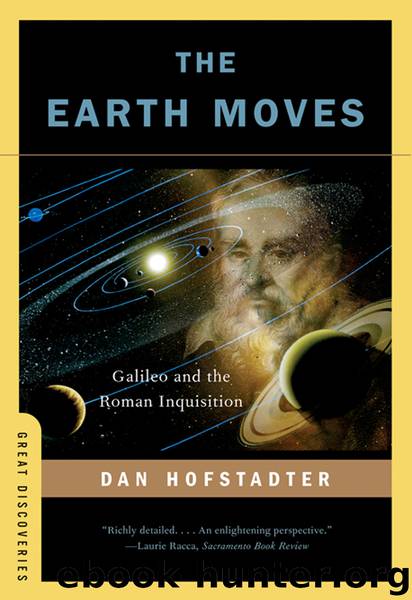The Earth Moves by Dan Hofstadter

Author:Dan Hofstadter
Language: eng
Format: epub
Publisher: W. W. Norton & Company
Published: 2009-05-05T16:00:00+00:00
3
The Trial; or, Not Seeing
At the time of the summons to Rome, Galileo was still philosopher and mathematician to the Grand Duke Ferdinand II of Tuscany. We may wonder therefore why the duke never raised a finger to save one of his highest-paid and most prestigious courtiers. Treachery? Pusillanimity? No: Ferdinand, then twenty-two, was neither perfidious nor cowardly; rather, the offhand betrayal of Galileo fell into an already established pattern of Tuscan subservience to the Vatican. Discussions of Galileo’s trial seldom raise the question of his extradition, which is accepted as an inevitability to be passed over in silence. In fact, it was such an inevitability, but how it came to be so requires some explanation.
The grand duchy of Tuscany, though constrained like any small principality to pursue a cautious foreign policy, possessed the formal attributes of sovereignty. Florence was then suffering a political decline, but Ferdinand theoretically was an absolute ruler, and in the absence of a concordat between Tuscany and the Papal States, the surrender of one of Europe’s leading scientists to a tribunal of the Holy Office at first seems self-destructive on his part, an act of suicidal lèse-majesté. After all, it wasn’t as if the ecclesiastical realm, whose territory extended over a portion of central Italy, enjoyed great respect in the peninsula—far from it. Sneered at by the Venetian Republic and threatened by Spain, which ruled Naples and the south, it often found its agencies thwarted or mocked. Venice imposed severe limits on the jurisdiction of the Roman Inquisition within its boundaries, assigning many cases of blasphemy and witchcraft to its own secular courts, insisting that all inquisitorial judges be citizens of the Serenissima, and tending to reject denunciations and testimony proceeding from outside the Veneto. The Roman Inquisition was also seriously hampered at Naples, whose people had rioted in 1547 against the introduction of the Spanish Inquisition, and secular rulers elsewhere meddled in its activities. If Galileo had remained at Padua, on the Venetian mainland, it is doubtful that he would ever have fallen into the hands of the Roman Inquisition, especially in that he stood accused not of heresy but of “rashness,” a lesser offense.
At first, Galileo and his allies tried to secure a change of venue, to the Inquisition’s office at Florence, where he might defend himself orally and in writing. He was unwell; a plague was rife in some Tuscan provinces; ever short of funds, he feared the expense of detainment in Rome; and the vague possibility of a so-called rigorous examination, or torture by the corda, a variant of the rack, theoretically hung over him should he be deemed to be withholding evidence. That putative secrets or intentions can be extorted through the application of pain is an ancient and universal idea. Though torture was practiced far more readily by civil courts than by the Roman Inquisition, it was far from unknown in this religious context.
Fully aware of the peril Galileo was running, Ferdinand did nothing to protect his most famous subject.
Download
This site does not store any files on its server. We only index and link to content provided by other sites. Please contact the content providers to delete copyright contents if any and email us, we'll remove relevant links or contents immediately.
| Buddhism | Christianity |
| Ethnic & Tribal | General |
| Hinduism | Islam |
| Judaism | New Age, Mythology & Occult |
| Religion, Politics & State |
Cecilia; Or, Memoirs of an Heiress — Volume 1 by Fanny Burney(31341)
Cecilia; Or, Memoirs of an Heiress — Volume 3 by Fanny Burney(30938)
Cecilia; Or, Memoirs of an Heiress — Volume 2 by Fanny Burney(30896)
The Secret History by Donna Tartt(16643)
Sapiens: A Brief History of Humankind by Yuval Noah Harari(13067)
Leonardo da Vinci by Walter Isaacson(11912)
The Radium Girls by Kate Moore(10914)
Sapiens by Yuval Noah Harari(4546)
The Wind in My Hair by Masih Alinejad(4427)
How Democracies Die by Steven Levitsky & Daniel Ziblatt(4407)
Homo Deus: A Brief History of Tomorrow by Yuval Noah Harari(4287)
Endurance: Shackleton's Incredible Voyage by Alfred Lansing(3852)
The Silk Roads by Peter Frankopan(3769)
Man's Search for Meaning by Viktor Frankl(3644)
Millionaire: The Philanderer, Gambler, and Duelist Who Invented Modern Finance by Janet Gleeson(3574)
The Rape of Nanking by Iris Chang(3522)
Hitler in Los Angeles by Steven J. Ross(3443)
The Motorcycle Diaries by Ernesto Che Guevara(3340)
Joan of Arc by Mary Gordon(3262)
